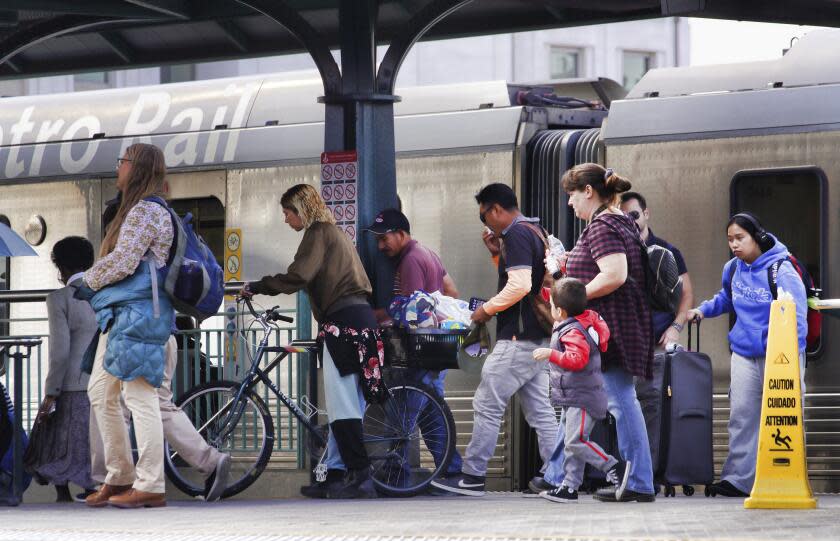'Driving in traffic is stressful': More commuters are trying public transit after fire closes 10 Freeway

Caprice "Kip" Harper was among those commuters who heeded the call from transit officials to take public transportation after a fire under the 10 Freeway in downtown Los Angeles closed that vital thoroughfare.
Harper, an archaeologist for the state, opted for a 50-minute commute on the Metro's A line train from Pasadena to downtown L.A. Thursday morning to partake in a strike held by California state scientists calling for more pay.
“I wanted to chill out,” she said. “Driving in traffic is stressful, and I also wanted to save energy for the protest.”
Preliminary data from transportation officials suggest that the closure of the freeway may have prompted more motorists like Harper to jump on public transit to avoid the traffic headache created in downtown Los Angeles after a fire erupted under the 10's overpass at Alameda Street on Saturday morning. The fire was fueled by wood pallets stored there and is being investigated as an arson.
The Los Angeles County Metropolitan Transportation Authority recorded a 10% increase in ridership on the E line train that runs parallel to the 10 Freeway Monday and Tuesday, L.A. Metro Communications Director Dave Sotero said. L.A. Metro also reported a 25% increase in parked cars at outlying stations including Norwalk, Lakewood, Azusa and East L.A. on Thursday.
Read more: Metro wants riders back. Those green-shirted 'transit ambassadors' are part of the plan
"Metro usage is up and we need to continue that until we get to Tuesday,” Mayor Karen Bass said at a press conference Friday, urging commuters taking the Metro system this week to make it a habit even after the freeway opens.
It remains unclear, however, if there has been a notable uptick in ridership on the entire regional system this week in response to the freeway closure. L.A. Metro said it does not yet have data on overall ridership for this month.
While Gov. Gavin Newsom announced Thursday that the 10 Freeway would reopen by Tuesday — much sooner than expected — the roughly 300,000 commuters that drove that stretch of the freeway daily have been tasked with finding alternative routes or modes of transportation until then. But many commuters have chosen to continue driving, opting for side streets through neighborhoods in the city's core.
To help speed up the commute for those taking public transit, the Los Angeles Department of Transportation has adjusted signal times along the A and E train lines for faster service into downtown L.A. The L.A. Metro has also added buses to Line 66, which runs along Olympic Boulevard, and Line 51, which runs along Soto Street, while Metrolink increased the number of commuter trains from San Bernardino and Covina to Union Station. Bass even rode the Metro's E line train to work Wednesday morning, encouraging commuters to take public transit while the 10 is closed.
Although taking the Metro had a “comparable” commute time to driving, Harper’s first 15 minutes of her Thursday commute was spent getting to the nearest Metro station, Fillmore Station. It’s a reality that deters many locals from ditching their car and hopping on the train.
For many others, mass transit wasn't a viable option.
Ashley Olmeda, 30, said taking public transit just does not make sense for her when the nearest Metro train station to her residence in Alhambra is an 18-minute drive to Memorial Park Station in Pasadena. She instead drove 40 minutes to downtown L.A., a drive that would have normally taken 15 minutes. But it was still the better alternative to taking public transit, she said.
“There’s no Metro near me, so I would have to go out to Pasadena to the nearest Metro station,” she said. “But if I had access to one, I would [take public transit].”
For others, using public transit is not feasible when they need to get around the city throughout the day.
Read more: L.A.'s post-fire push for public transportation: Free rides, faster trains, more buses
Tom Somers, 69, came into downtown L.A. from La Cañada Flintridge to go to court Thursday morning. As a lawyer, he needs to be able to travel freely between the Ronald Reagan Federal Building and U.S. Courthouse in downtown L.A. to his office in Koreatown.
“I’d like to [take the Metro]. I’d really like to,” he said. “But I need to get to court and the office and driving makes more sense for that.”
He instead opted for a 65-minute commute to downtown L.A., which would normally have taken him 35 minutes, he said.
This story originally appeared in Los Angeles Times.

 Yahoo News
Yahoo News 
